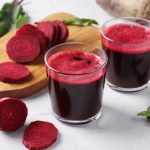Don’t ignore beets’ essential health benefits
 (NaturalHealth365) Beets may not be high on your list of favorite foods, but word about their health benefits and nutrition is spreading. For instance, a new study published in the European Respiratory Journal found that drinking beetroot juice can significantly lower blood pressure in COPD patients. Another study published in the Hypertension Journal showed that beet juice is as effective as medications for lowering blood pressure and (best of all) without negative side effects.
(NaturalHealth365) Beets may not be high on your list of favorite foods, but word about their health benefits and nutrition is spreading. For instance, a new study published in the European Respiratory Journal found that drinking beetroot juice can significantly lower blood pressure in COPD patients. Another study published in the Hypertension Journal showed that beet juice is as effective as medications for lowering blood pressure and (best of all) without negative side effects.
In fact, drinking beet juice – as part of a nitrate-rich diet – has also been linked with increased blood flow to the brain and better cognitive performance, according to a study published in the journal Nitric Oxide.
Why beets should be part of your diet
From disease prevention to sports performance, the benefits of beets are more than you can imagine. Here are 9 of the most compelling benefits of beet nutrition:
1. Rich in fiber and key nutrients
Fiber is linked with gut health and a feeling of satiety that lasts. Beets’ nutrition also includes vitamin C, potassium, folate, and manganese. And, because of their nutrient content – beets can help to support organ, nerve and bone health as well as the immune system.
2. Increased energy and stamina
Beets are loaded with healthy carbohydrates for energy. Studies have shown that drinking beet juice prior to a workout can extend an exercise session by 16 percent.
As nitrates are turned into nitric oxide, the body’s oxygen “cost” is reduced during physical activity.
3. Regulates blood pressure
Beet juice is a potent and effective natural way to lower blood pressure. Just one glass of beet juice drops systolic blood pressure by around 4 to 5 points.
This is likely due to its nitric oxide content – which naturally relaxes and dilates the blood vessels, improving the flow of blood and lowering pressure.
4. Reduces inflammation
The nutrient betaine in beets is known for protecting proteins, enzymes, and cells from environmental stress. This, in turn, helps to reduce inflammation, improve vascular risk factors, protect internal organs, and enhance internal performance.
Of course, reduced inflammation will also provide greater protection against many chronic illnesses, including cancer, heart disease, autoimmune disorders and dementia.
5. Detoxification
Beets contain betalin pigments, which aid in detoxification. Broken-down toxins essentially bind to the molecules and can then be excreted.
In this way, beets purify both the blood and the liver.
6. Improved cardiovascular health
The high fiber content of beets helps balance cholesterol levels by lowering triglycerides and LDL cholesterol while increasing HDL cholesterol. This clears out the arteries and may help reduce the risk of heart attack, stroke, atherosclerosis, and other heart issues.
7. Reduced cancer risk
The phytonutrients that give beets and other produce their deep color are associated with antioxidant and anticancer benefits. In fact, research has shown that beetroot extract blocks tumor formation in numerous cancer types.
8. Respiratory issues
The high content of vitamin C in beets also makes it effective in combating respiratory problems. It reduces the symptoms of asthma and also reduces the chances of lung issues, including cancer.
9. Eye health
The beta-carotene, or vitamin A, in beets, also gives them a protective effect on the eyes. Eating beets lowers your risk of macular degeneration, eye strain, cataracts, and other eye diseases.
Clearly, this unassuming root vegetable backs an incredible punch for good health. In addition to eating organic sliced beets and beet greens on salads and on sandwiches, consider also drinking beet juice regularly and mixing concentrated beet powder into smoothies.
Sources for this article include:
Ersjournals.com
AHAJournals.org
NIH.gov
NIH.gov
NIH.gov
NIH.gov
EurekaSelect.com



